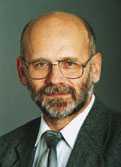 Marek
D¹browski, Professor of Economics, Chairman of the Council of the
CASE - Center for Social and Economic Research in Warsaw, Chairman of
the Supervisory Board of the CASE-Ukraine in Kiev, former First Deputy
Minister of Finance of Poland (1989-1990) and former Member of the Monetary
Policy Council of the National Bank of Poland (1998-2004). In the last
decade he has been involved in policy advising and policy research in
Belarus, Bosnia and Herzegovina, Bulgaria, Georgia, Iraq, Kazakhstan,
Kyrgyzstan, Macedonia, Moldova, Mongolia, Romania, Russia, Serbia, Ukraine
and Uzbekistan ans in a number of international research projects related
to monetary and fiscal policies, currency crises, EU and EMU enlargement,
and political economy of transition.
Marek
D¹browski, Professor of Economics, Chairman of the Council of the
CASE - Center for Social and Economic Research in Warsaw, Chairman of
the Supervisory Board of the CASE-Ukraine in Kiev, former First Deputy
Minister of Finance of Poland (1989-1990) and former Member of the Monetary
Policy Council of the National Bank of Poland (1998-2004). In the last
decade he has been involved in policy advising and policy research in
Belarus, Bosnia and Herzegovina, Bulgaria, Georgia, Iraq, Kazakhstan,
Kyrgyzstan, Macedonia, Moldova, Mongolia, Romania, Russia, Serbia, Ukraine
and Uzbekistan ans in a number of international research projects related
to monetary and fiscal policies, currency crises, EU and EMU enlargement,
and political economy of transition.
Abstract of the speech:
Globalisation increases competition in international markets of goods and services, in capital markets and, to a smaller extent, in labour markets. Economic agents can diversify business activity by moving investments and assets between countries and currencies. They can take advantage of currency arbitrage, of differences in legal infrastructure and regulatory systems, including taxation, property rights' protection, and the overall country risk. For these reasons, the national sovereignty becomes limited even if the country does not formally belong to any integrated block. Limited sovereignty affects a country's social, economic and political life, and it raises the standards of economic and political responsibility. It serves as a disciplining mechanism against trade unions' wage and political demands and against political and economic populism. Membership in the European Union has a mixed impact on the scale of systemic and policy competition. On the one hand, the Single European Market and its four basic freedoms increase each member country exposure to this kind of arbitrage giving all economic agents opportunity to move its activity to other country. On the other hand, EU law and policy harmonization narrows areas of such a competition.